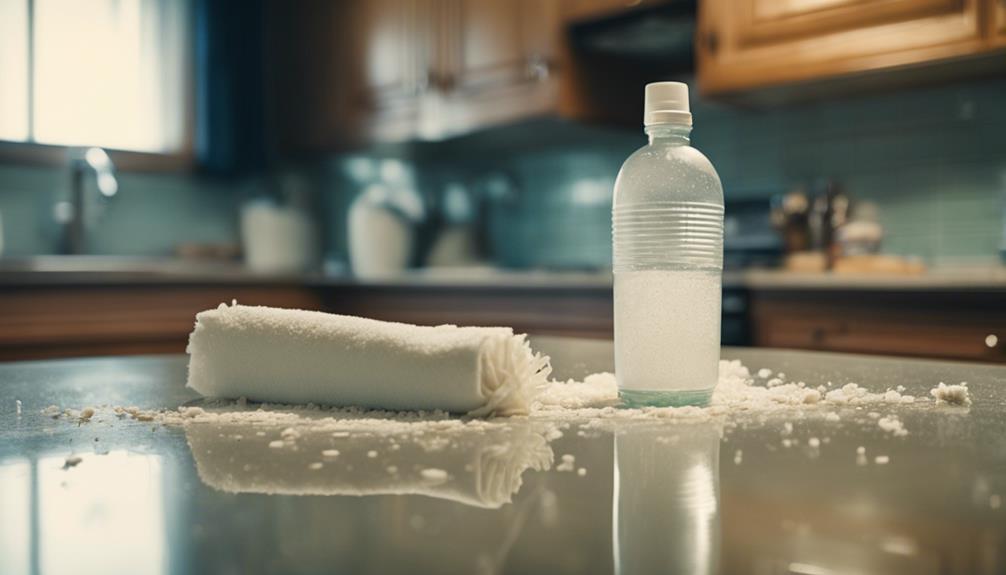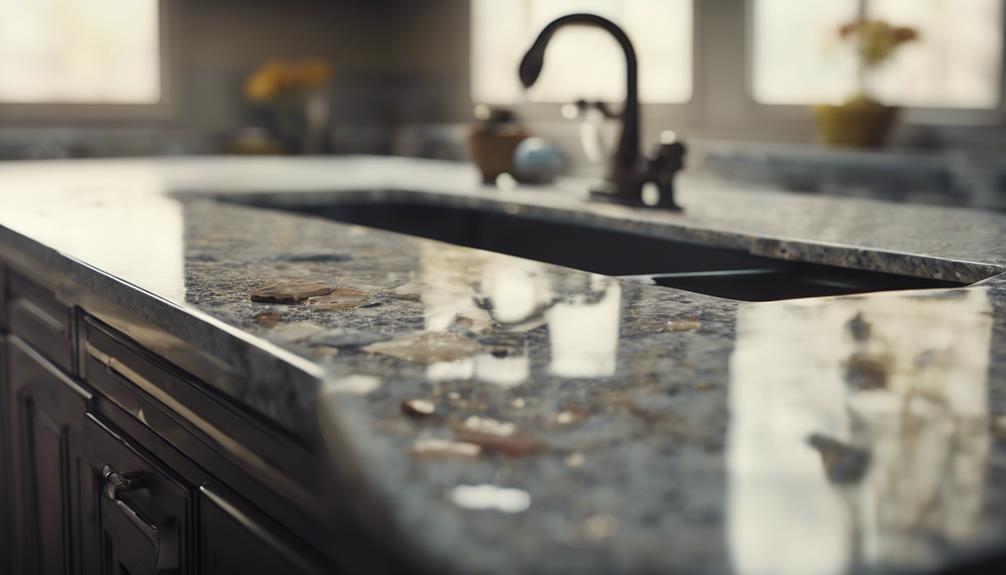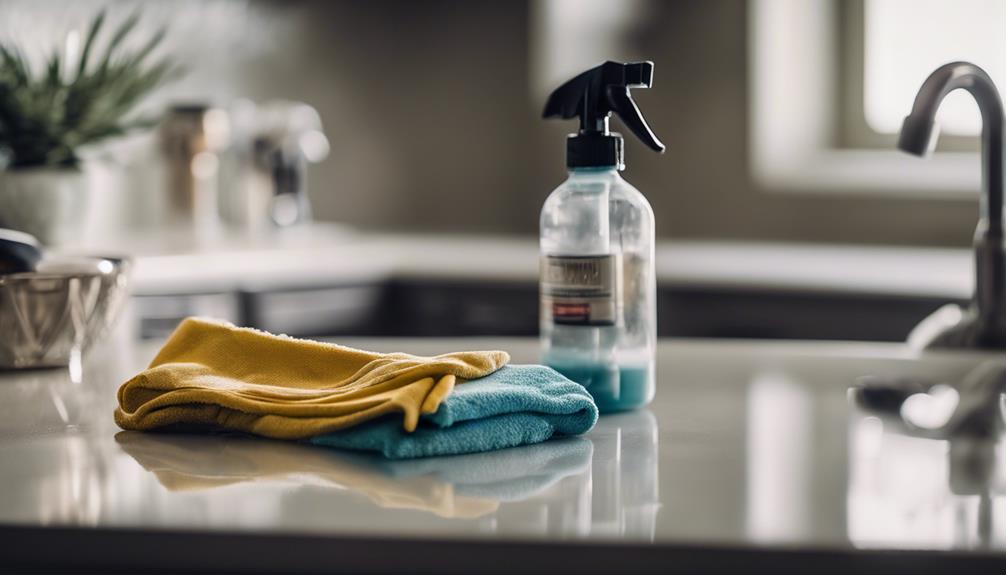You're about to tackle countertop disinfection and cleaning, but do you have the right strategies in place? Start by choosing the right cleaning products for your countertop material, avoiding harsh chemicals and opting for eco-friendly solutions. Clear your countertops of clutter, wipe them down with soapy water, and apply a disinfectant solution. If you're using bleach, follow the correct dilution ratio and take necessary safety precautions. Natural alternatives like vinegar and hydrogen peroxide can be just as effective. By following these essential tips, you'll be well on your way to a cleaner, safer kitchen – and there's more to discover to make sure your countertops remain hygienic and stain-free.
Choose the Right Cleaning Products
When selecting cleaning products for your countertops, start by identifying the type of material you have, as different surfaces require specialized care to prevent damage or discoloration. You'll want to choose the right cleaning products that are specifically formulated for your countertop material.
Consider using non-abrasive cleaners to maintain the finish and appearance of your countertops. Look for disinfectants labeled as effective against common kitchen bacteria and viruses for thorough cleaning. Be sure to avoid harsh chemicals like bleach on certain countertop surfaces, as they can cause etching or staining.
Instead, opt for eco-friendly or natural cleaning solutions to minimize chemical exposure and protect the environment. By selecting the right cleaning products, you'll be able to effectively disinfect your countertops without causing damage. Remember, the goal is to achieve a thorough cleaning while also protecting your surfaces and the environment.
Prepare Your Countertops for Disinfection
With your cleaning products in hand, it's time to clear and prepare your countertops for a thorough disinfection. Remove all items from the countertops to make sure nothing gets in the way of a thorough cleaning.
Next, wipe down the countertops with warm, soapy water to remove surface dirt and debris. This step is important in preventing the spread of germs and bacteria.
As you clean, inspect the countertops for any stubborn stains or spills that may require targeted cleaning. Take a closer look at areas around sinks, faucets, and countertops with high traffic.
Once you've removed any surface dirt and debris, you're ready to apply a disinfectant solution or wipes specifically designed for countertops. Remember to follow the product's instructions and allow the disinfectant to sit for the recommended contact time to effectively kill germs and bacteria.
Disinfect With Bleach Safely

You're now ready to disinfect your countertops with bleach, a powerful solution that requires caution and attention to safety guidelines.
To disinfect with bleach safely, it's crucial to follow the right dilution ratios. Mix 1/3 cup of bleach with a gallon of water for effective disinfection. Apply the solution to your countertops, let it sit for 10 minutes, and then rinse thoroughly with water.
Remember to follow product-specific instructions for proper dilution ratios and safety precautions when using bleach. Guarantee proper ventilation to avoid inhaling harmful fumes. Always wear gloves to protect your skin, and avoid mixing bleach with other cleaning products to prevent dangerous chemical reactions.
Never mix bleach with other cleaning products, as this can lead to hazardous chemical reactions. By taking these precautions, you can safely disinfect your countertops with bleach.
Natural Alternatives to Bleach
Your pursuit of a more eco-friendly cleaning routine can start with vinegar and hydrogen peroxide, two natural alternatives to bleach that pack a powerful disinfecting punch. Vinegar's acidic properties make it a popular choice for killing germs and bacteria on surfaces, making it an effective tool for countertop disinfection.
Hydrogen peroxide is another potent disinfectant that can be used alone or in combination with vinegar for enhanced cleaning results. The best part? These natural alternatives are safer for the environment, non-toxic, and can be just as effective as chemical cleaners like bleach.
Cleaning Different Countertop Materials

Different countertop materials demand distinct cleaning approaches, and understanding these unique requirements is essential to maintaining their appearance and longevity.
For instance, when it comes to Laminate countertops, you should use a multipurpose cleaner without bleach to clean the surface. If you notice any stains, a baking soda paste can be an effective treatment.
On the other hand, Granite countertops require gentle cleaning with soap and water, avoiding harsh substances like vinegar, lemon juice, and bleach.
When it comes to Quartz countertops like Cambria, Caeserstone, and Silestone, you should sanitize them with isopropyl alcohol for Disinfecting Your Countertops. Avoid using bleach and glass cleaners for maintenance, as they can cause damage.
For tough stains on quartz, a baking soda paste can be effective in removing them without causing damage. Remember, each type of countertop material has its specific care requirements, so it's essential to use the appropriate cleaning methods to maintain their appearance and longevity.
Avoiding Damage and Stains
In order to prevent damage and stains on your countertops, it's vital to take proactive measures, starting with the avoidance of harsh cleaners and everyday habits that can cause harm.
When it comes to disinfecting granite, avoid using harsh cleaners like bleach or white vinegar, as they can etch the surface. Instead, opt for a gentle cleaner specifically designed for your countertop material.
To protect the countertop from scratches and heat damage, always use a cutting board or trivet. Clean up spills immediately to prevent stains and discoloration, especially on laminate or wood countertops.
Preventing stains is key, so use coasters for glasses and bottles to prevent water rings and stains. Regularly clean and maintain your countertops to avoid buildup of dirt, grime, and potential stains.
Regular Maintenance for Hygiene

To maintain a hygienic kitchen environment, you clean your countertops daily with warm, soapy water to prevent bacterial growth and reduce the spread of germs. This daily maintenance is vital in keeping your kitchen clean and bacteria-free.
In addition to daily cleaning, you should disinfect high-touch areas on your countertops frequently to minimize the spread of germs. It's also essential to properly clean and disinfect your sponges and dishrags regularly to prevent the spread of bacteria.
Remember to differentiate between cleaning and disinfecting surfaces to guarantee thorough sanitation and cleanliness. By establishing a consistent cleaning routine for your countertops, you'll maintain a healthy and bacteria-free food preparation area.
Make it a habit to clean and disinfect your countertops regularly to ensure a hygienic kitchen environment. By following these simple tips, you'll be able to enjoy a clean and healthy kitchen space.
Conclusion
As you've now mastered the art of countertop disinfection and cleaning, it's no coincidence that your kitchen will start to feel like a safer, healthier space. By following these 7 essential tips, you'll be wiping out germs and bacteria like a pro, and your countertops will shine like new.
Remember, a clean countertop is just a habit away – make it a part of your daily routine and you'll be enjoying a germ-free zone in no time!